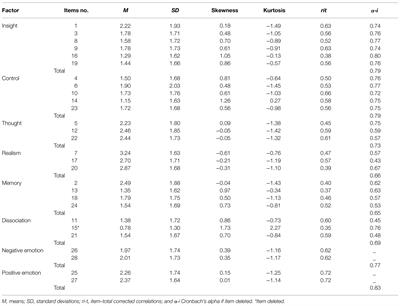Validation of the Spanish Version of the Lucidity and Consciousness in Dreams Scale
Lucid dreaming, a specific phenomenon of dream consciousness, refers to the experience being aware that one is dreaming.

The primary aim of this research was to validate a Spanish version of the Lucidity and Consciousness in Dreams scale (LuCiD). A secondary aim was to explore whether meditation experience and mindfulness trait were related to LuCiD scores. Data from 367 Spanish men (34.6%) and women (65.4%) who completed LuCiD, the Five Facets of Mindfulness Questionnaire (FFMQ), and the Positive and Negative Affect Schedule (PANAS) were examined. From the total sample, 40.3% indicated some experience with formal meditation (meditators), while 59.7% did not have any meditation experience (non-meditators). A random subsample of 101 participants, who completed LuCiD for a second time after a period of 10–15days, was used for test–retest reliability analysis.
The LuCiD scale comprises 28 items distributed across eight factors: insight, control, thought, realism, memory, dissociation, negative emotion, and positive emotion. Factor structure, reliability by both internal consistency and test–retest reliability, and construct and concurrent validity were tested. Confirmatory factor analysis (CFA) confirmed the original eight-factor model, showing goodness of fit in contrast to a single-factor model. Item 15 was deleted from the Dissociation factor as it performed poorly (i.e., skewness and kurtosis, non-normal distribution of responses, and corrected item–total correlation under 0.40).
The scale showed adequate values of internal consistency (between α=0.65 for Memory and α=0.83 for Positive Emotion) and test–retest reliability by significant Pearson correlations (p<0.001) for each factor.
The scores of meditators were higher for the LuCiD scale Insight and Dissociation factors, in contrast to those of non-meditators.
The Observing facet of mindfulness was positively associated with all LuCiD factors, except Realism and Positive Emotion, and the Acting with Awareness facet showed a negative correlation with the LuCiD factor Realism. Finally, positive and negative affects was associated with the LuCiD factors Positive Emotion and Negative Emotion. This study provides a valid and reliable measure for exploring lucidity and consciousness in dreams for a Spanish population, Moreover, the results suggest a relationship with meditation experience, mindfulness trait, and positive and negative affect.
Read the full article at the original website
References:
